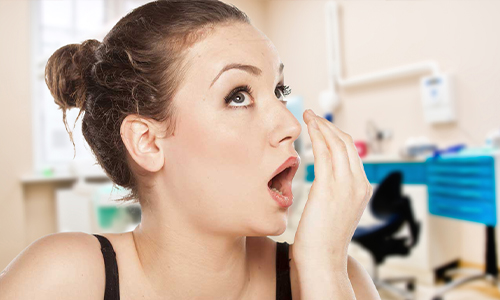Best Ways to Get Rid of Bad Breath
Do you have bad breath then find the best ways to get rid if bad breath? According to latest research, more than 70 million people suffer from bad breath, and 60 percent of adults suffer from it at some point. Typically, it arises from the poor health of the gums and tongue.
Bad breath can be embarrassing, but it is a common problem and can be avoided. Follow these ways to get rid of bad breath and maintain a healthy mouth:
Top 12 Ways to Get Rid of Bad Breath
- Brush Your Teeth Twice a Day.
At least twice daily, brush your teeth for two to three minutes to remove plaque and food debris. It’s important to know when to brush at breakfast and always brush your teeth before bed. Adding baking soda to your brushing routine can reduce the acidity and bacteria that cause bad breath.
You should consider gargling even if you don’t brush your teeth after eating. A mixture of warm water and salt is an effective mouth rinse.
- Daily Dental Flossing
Flossing removes food particles that a toothbrush cannot reach between teeth. If food particles are not removed, bacteria feed on them, causing bad breath.
- Scrape or Brush Your Tongue
Bacteria can accumulate on the rough surface of your tongue and contribute to bad breath, so clean it regularly. To eliminate any buildup between the taste buds and folds of the tongue, you must clean the entire surface, not just the tip. A plastic tongue scraper, available at drugstores for a low price, is an excellent tool for this purpose. One can also brush your tongue with a toothbrush.
- Slake Your Thirst
Be sure to drink enough water (six to eight 8-ounce glasses) daily to prevent dry mouth, which contributes to bad breath. Water aids in odor control because it aids in the removal of food particles and bacteria, the primary causes of bad breath.
If you have persistent dry mouth or take medications that cause dry mouth, consult your dentist about an over-the-counter saliva replacement.
- Visit A Dentist
If you have chronic bad breath, you can visit your dentist, who can assess the severity of the condition.
Your dentist can evaluate oral health issues and refer you to your primary care physician or a specialist if an internal infection is suspected.
If you observe something unusual occurring in your mouth, consult your dentist. Additionally, you should visit your dentist regularly for cleanings.
Most adults visit the dentist annually. This is for your annual dental cleaning and examination. People with unique circumstances or dental conditions may see them more frequently.
In addition to helping you maintain fresh breath, regular dental visits can protect you from illness. Your dentist can detect gum disease, oral cancer, and other conditions.
- Consume a Piece of Sugar-Free Candy or Sugar-Free Gum
You can stimulate salivation by sucking on sugarless candy or chewing sugarless gum. Your saliva will assist in removing food particles and the bacteria that cause bad breath.
- Crunch Crisp Fruits and Vegetables
Carrots, celery sticks, and apples can be consumed as between-meal snacks to increase saliva production and eliminate bacteria. Additionally, these snacks can alleviate bad breath from hunger or fasting. As stomach acids accumulate, an empty stomach due to skipping meals can cause foul breath.
- Utilize a Mouthwash
If you have chronic bad breath due to a dental problem, using a mouth rinse will only mask the odor. In some instances, this may exacerbate the issue by irritating oral tissue.
Try a quick rinse with water and a few drops of peppermint oil instead. Or, you can gargle with black or green tea.
- Stop Smoking and Stay Away from Tobacco Products
If you ever needed a simple additional reason to quit, here it is: Cigarette smoking causes bad breath. Even after brushing one’s teeth, tobacco can leave a bad taste and odor in the mouth.
- Take in More Probiotics
In some cases, bad breath is caused by an imbalance of intestinal flora. You can restore balance to your flora by consuming probiotic-rich foods.
This includes yogurt, sauerkraut, kimchi, miso, and pickles.
Your food will not be adequately broken down if you lack sufficient digestive enzymes. Instead, it emits an offensive odor that travels to the mouth. Additionally, the foods listed above stimulate digestive enzymes.
Dryness in the mouth can also contribute to bad breath. You need saliva to eliminate bacteria and, consequently, odor. In addition, rinsing with water can stimulate salivation to eliminate bacteria.
- Pay Attention to Your Gums
Your gums are delicate and susceptible to infection in part of your mouth. Food can easily become lodged beneath the gum line and forgotten when brushing.
Ensure you care for your gums similarly to how you care for your teeth.
Circularly brush along the gumline carefully, and never use broad strokes across the gums, as this can cause damage.
To clean your gums, it is crucial to floss every night to remove any leftover food particles.
- Consume More Apples
A daily apple keeps the dentist away, correct?
Not necessarily, but apples are beneficial to dental health. Apples’ naturally fibrous texture can stimulate the gums when chewed. Additionally, they help remove plaque from between the teeth.
In addition, apples stimulate salivation, which then eliminates bacteria. And because apples lack a strong aroma, they do not contribute to bad breath.
Are You Prepared to Eliminate Bad Breath?
Use the tips listed above if you’re serious about eliminating bad breath. Ensure that you take excellent care of your mouth and teeth. And that you consume a great deal of water.
After having a proper dental hygiene routine, the most important tip is to visit the dentist. Ensure you schedule regular cleaning and examination appointments.
In search of a dentist in Chicago? Contact First Point Dental‘s experts. Our dental health professionals will assist you in maintaining a clean mouth and fresh breath.
How Can I Eliminate Halitosis Breath Permanently?
Practising good oral hygiene is the best way to permanently eliminate bad breath. This comprises:
- Performing dental hygiene after every meal
- At least twice a day, floss your teeth
- You should visit your dentist in Chicago every six months for a routine exam and cleaning.
- Consult your dentist for a medical diagnosis if your bad breath persists. Sometimes, bad breath may be caused by an infection, a disease, certain medications, periodontal disease, etc.
Contact our doctors to know more about ways to get rid of bad breath by identifying the underlying cause instead of treating the symptoms.

